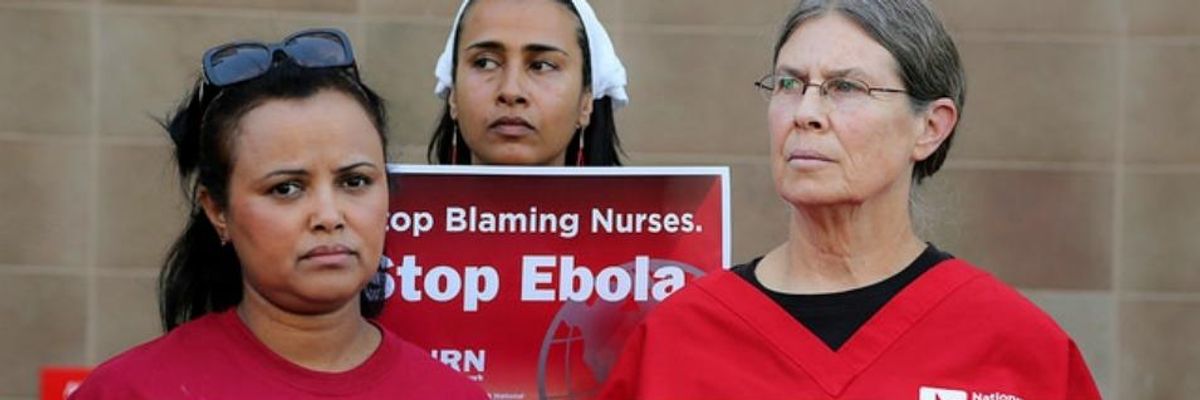As the Ebola outbreak continues to dominate headlines, so too do the stories of health care workers fighting to contain the disease. The climate crisis is morphing into a public health crisis, forcing nurses to join the ranks of other workers on the front lines of climate change: firefighters battling ever more destructive fires, farmers struggling to coax crops from drought-ravaged fields, fishermen hauling empty nets from warming waters. The nature of work is changing and we're not prepared.
For nurses, the risks became strikingly clear when news leaked out that Amber Vinson and Nina Pham, two nurses at Texas Presbyterian Hospital in Dallas, had contracted Ebola while caring for Thomas Eric Duncan, a Liberian national infected with the disease. While both nurses thankfully recovered, their situation highlights nurses as a new generation of "climate workers" exposed to expanding dangers on the job.
Stunningly, instead of celebrating the bravery of a profession the nation regards as its most trusted and respected, politicians and media reacted to the Ebola outbreak by blaming nurses for their carelessness. In fact, it's the policy makers and hospital administration, not nurses, who are being "careless" by failing to take the measures necessary to protect healthcare workers and patients.
After the Ebola outbreak, the NNU surveyed 3,000 nurses from 800 health facilities in 48 states and the District of Columbia. They report that "a shocking 84 percent say their hospital is still not holding the essential, interactive training programs, and more than a third cite inadequate supplies of protective gear."
In California not one hospital is adequately prepared. According to RoseAnn DeMoro, executive director of the California Nurses Association and National Nurses United: "We cannot name a hospital that we feel comfortable with, for patients in the state...to attempt to have the appropriate response in an Ebola situation." Last week the NNU put out a statement demanding action to protect healthcare workers and patients:
[N]ot one more patient, nurse, or healthcare worker should be put at risk due to a lack of healthcare facility preparedness. The United States should be setting the example on how to contain and eradicate the Ebola virus.
The World Health Organization has called Ebola "the most severe, acute health emergency seen in modern times." But can the outbreak be directly linked to the climate crisis? While a relation between Ebola and global warming is already hotly being debated, study after study shows that infectious diseases are becoming more virulent, and spreading faster, as a result of conditions directly related to a changing climate. The Ebola outbreak is a harbinger of the future.
Many of the most deadly diseases on earth -- malaria, dengue and yellow fever, encephalitis and cholera -- are highly climate sensitive, and are thriving as patterns of temperature, precipitation, and sea levels shift in their favor. They are spreading to new parts of the globe, including the U.S.
Dengue fever, which was wiped out in the U.S. in the World War II era, has now made a dramatic reappearance in the Florida Keys. Commonly called 'breakbone fever' because it causes pain so severe it feels like one's bones are breaking, dengue is expected to spread over the next 60 years, exposing an additional two billion people.
Rodents, insects and other disease host populations are also exploding. Parasites and microbes are marching steadily northward, with infections such as Lyme disease increasing tenfold in the past 10 years.
As climate diseases escalate so does the need for global first responders. Nurses organizations, like the NNU, have stepped up to play this role. In the wake of Typhoon Yolanda, for example, over 500 RNs traveled to the Philippines to volunteer their skills. When Haiti was hit by a devastating earthquake, 12,000 RNs from across the nation responded in a matter of days.
The climate crisis has changed the world of health care. Nurses have been at the forefront, and their role will only continue to expand. It is critical that we as a society figure out how to protect our health care workers as they step into the breach.
